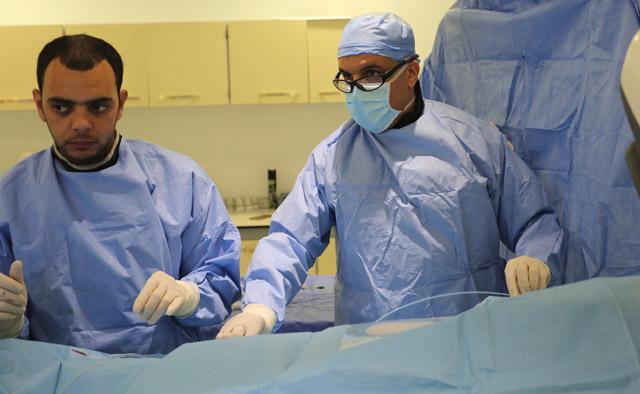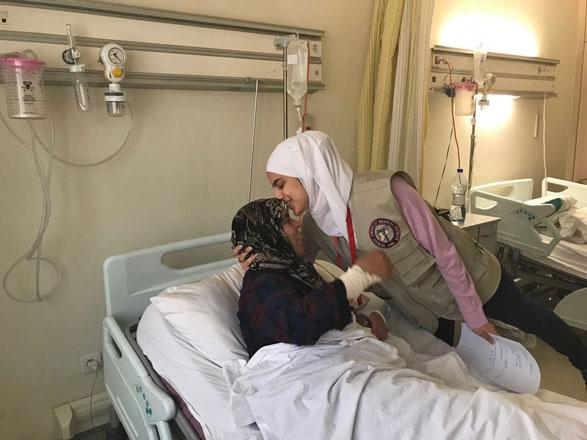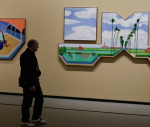You are here
Jordanian cardiologist leads Syrian-American Medical Society’s mission to Kingdom
By Dana Al Emam - Jul 12,2017 - Last updated at Jul 12,2017

SAMS' seven-day mission, which concludes on Thursday, includes teams of cardiologists working back-to-back from 6:30am until 9 or 10pm (Photo by Numan Alqazah)
AMMAN — It is the belief that everybody is able to contribute positively to his or her country that motivated US-based Jordanian cardiologist Wael Al Husami to lead the Syrian-American Medical Society's (SAMS) interventional cardiology mission to Jordan, he told The Jordan Times on Wednesday.
The association's cardiology mission to Jordan seeks to help Syrian refugees without access to cardiology care, or insufficient financial resources to access cardiology services, by providing free interventional cardiology measures, including cardiac catheterisation and open heart surgeries, Husami noted.
In addition, the SAMS' clinics across the country provide follow-up services and medications to those in need and patients who undergo surgical interventions.
Avowedly non-political, the non-profit medical relief organisation also prepares lists of patients to undergo cardiology intervention through the missions, which take place every three months.
Cardiology interventions, including cardiac catheterisation, take place at the Gardens Hospital in Amman, while patients in need of open heart surgeries are referred to the University of Jordan Hospital.
So far, SAMS' six cardiology missions have treated over 500 patients through clinical and non-clinical services, while 75 others have undergone catheterisation in each mission, Husami said.
Around 15-25 per cent of patients are Jordanians, he noted in an interview on Wednesday.
A single mission lasts for six to seven days and includes three teams of cardiologists working back-to-back, from 6:30am until 9 or 10pm.
Through his work in the mission, Husami, who is also the medical director of International Health and senior executive health physician at Lahey Hospital and Medical Centre in Burlington, Massachusetts, has heard many "sad stories" from Syrians.
"There is a high level of stress and anxiety among Syrians due to what they have experienced in the war," he told The Jordan Times, noting that tension tends to increase the risk of heart disease.
Meanwhile, he commended the Jordanian government for facilitating the mission's work.
At the same time, the mission helps the government indirectly, because it reduces the load on local hospitals and health facilities, Husami said.
"Everybody, in all fields, can provide something and must not wait for the government to do everything," he said, adding that the emergence of local medical and philanthropic missions would help more patients.
Husami, a University of Jordan graduate, served at Al Bashir Hospital for five years, and believes this is his way of repaying his country.
Yusuf Mohammad, a Syrian living in Zaatari Refugee Camp, is one of the recipients of the mission's cardiac interventional services and medical follow-up.
"I have suffered from chest pain and fatigue for over a year," he told The Jordan Times after he underwent a cardiac catheterisation on Wednesday.
Lying down on the bed next to Mohammad was 38-year-old Murad Rifai, another Syrian refugee who suffered a cardiac arrest nearly six weeks ago.
Commenting on Rifai's case, Husami said war-related tension and anxiety add to existing heart disease risk factors, a matter that results in an increase of heart diseases among Syrians at a younger age.
Esperance, a Jordanian woman who preferred to go by her first name only, was waiting her turn to undergo a cardiac catheterisation that would examine her cardiovascular condition, as she had been suffering pain in her left arm and a general feeling of weakness.
She told The Jordan Times that she had previously visited a cardiologist at a private clinic, who told her that the catherisation would cost up to JD5,000, an amount she cannot afford to pay.
This mission comprises 55 local and international volunteers who have donated their time and efforts to make the mission successful, according to Husami.
He added that the majority of volunteers have travelled overseas from the United States, Europe and other countries.
Samah Abu Omar, a doctor at the capital's Gardens Hospital who volunteered to participate in the mission, said: "The mission is a great opportunity to help a large number of patients in need of medical intervention in a short time."
Cardiologist Anas Safadi, a Syrian American coming from Indiana, said that he was keen about donating money for Syrians since the outbreak of the Syrian conflict. However, when he was introduced to the SAMS' missions to Jordan, he insisted on joining.
Since the first time he volunteered in January's mission, Safadi has "fallen in love with the concept" and has promised himself to join all future missions if possible.
His colleague Luay Sayed, another Syrian-American cardiologist in the mission, said that dealing with those affected by the Syrian crisis, who have been waiting for so long to receive the needed cardiac intervention, is completely different from learning about the conflict through media outlets.
SAMS' seven-day mission concludes this Thursday.
Related Articles
AMMAN — The Syrian American Medical Society (SAMS) on Thursday concluded its largest medical mission to Jordan to date, which brought togeth
AMMAN — Deputising for HRH Princess Muna, patron for Nursing and Midwifery in the Eastern Mediterranean Region and president of the Jordania
AMMAN — Five-year-old Ajmal Fayez might not have been able to undergo the cardiac operation she needed if it were not for the Czech governme

















